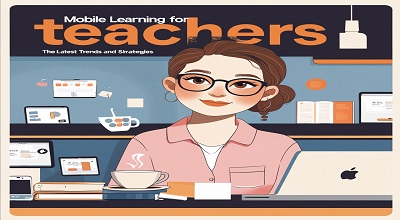Mobile Learning for Teachers
Mobile learning for teachers, or m-learning, refers to the use of smartphones, tablets, and other portable devices to facilitate education anytime, anywhere. With the rapid advancement of technology, teachers now have access to a wide range of tools that enhance teaching and learning experiences.
In recent years, mobile learning has gained significant traction in education due to its flexibility, accessibility, and ability to engage students. Teachers can now leverage mobile apps, online courses, and interactive platforms to improve lesson delivery, student engagement, and professional development.
This blog explores the latest trends, benefits, challenges, and future prospects of mobile learning for teachers.
Benefits of Mobile Learning in Education
Mobile learning offers numerous advantages for both teachers and students. Below are some key benefits:
Accessibility and Flexibility
- Teachers can access educational resources anytime, anywhere.
- Enables learning beyond the traditional classroom setting.
Personalized Learning
- Mobile apps allow customized learning experiences based on student needs.
- Adaptive learning technologies help in differentiated instruction.
Enhanced Engagement
- Interactive apps, gamification, and multimedia content make learning fun.
- Increases student participation and motivation.
Professional Development for Teachers
- Teachers can enroll in online courses, webinars, and certification programs.
- Platforms like Coursera, edX, and Khan Academy offer teacher training.
Cost-Effective Learning
- Reduces the need for physical textbooks and printed materials.
- Many educational apps are free or low-cost.
Latest Trends in Mobile Learning for Teachers
The field of mobile learning is evolving rapidly. Here are the latest trends shaping education in 2024:
AI-Powered Learning Apps
- AI chatbots and virtual tutors assist teachers in answering student queries.
- Tools like ChatGPT and Google Bard provide instant educational support.
Gamification in Education
- Apps like Kahoot! and Quizizz make learning interactive through quizzes and games.
- Increases student engagement and retention.
Augmented Reality (AR) and Virtual Reality (VR)
- AR/VR apps like Google Expeditions provide immersive learning experiences.
- Helps in teaching complex subjects like science and history.
Microlearning
- Short, bite-sized lessons for quick learning.
- Platforms like Duolingo and Blinkist use microlearning techniques.
Social Learning Platforms
- Teachers and students collaborate via Edmodo, Flipgrid, and Padlet.
- Encourages peer-to-peer learning and discussion.
Best Mobile Learning Apps for Teachers
Here are some of the top mobile learning apps that teachers should explore:
| App Name | Key Features |
|---|---|
| Google Classroom | Assignments, grading, and communication hub |
| Khan Academy | Free courses on various subjects |
| Quizlet | Flashcards and study tools |
| Edmodo | Social learning platform for classrooms |
| Seesaw | Student portfolio and parent engagement |
How Teachers Can Integrate Mobile Learning in Classrooms?
To effectively use mobile learning, teachers should follow these strategies:
Blended Learning Approach
- Combine traditional teaching with mobile learning tools.
- Use apps for homework, quizzes, and discussions.
Flipped Classroom Model
- Students learn lessons via mobile apps at home.
- Classroom time is used for discussions and problem-solving.
Encourage Collaboration
- Use platforms like Microsoft Teams and Slack for group projects.
Continuous Assessment
- Mobile quizzes and polls help track student progress.
Free Download: Nagatoto168 APK
Challenges and Solutions in Mobile Learning
Despite its benefits, mobile learning faces some challenges:
Digital Divide
- Not all students have access to smartphones or the internet.
- Solution: Schools can provide devices or offline learning options.
Distractions
- Students may misuse devices for non-educational purposes.
- Solution: Use classroom management apps like ClassDojo.
Data Privacy Concerns
- Ensuring student data security is crucial.
- Solution: Use apps with strong privacy policies.
Future of Mobile Learning in Education
The future of mobile learning looks promising with advancements in:
- 5G technology for faster internet access.
- Blockchain for secure certification.
- AI-driven personalized learning for adaptive education.
Conclusion
Mobile learning is transforming education by making it more accessible, engaging, and personalized. Teachers who embrace these tools can enhance their teaching methods and improve student outcomes.
More Here: Data Science vs. Data Analytics
